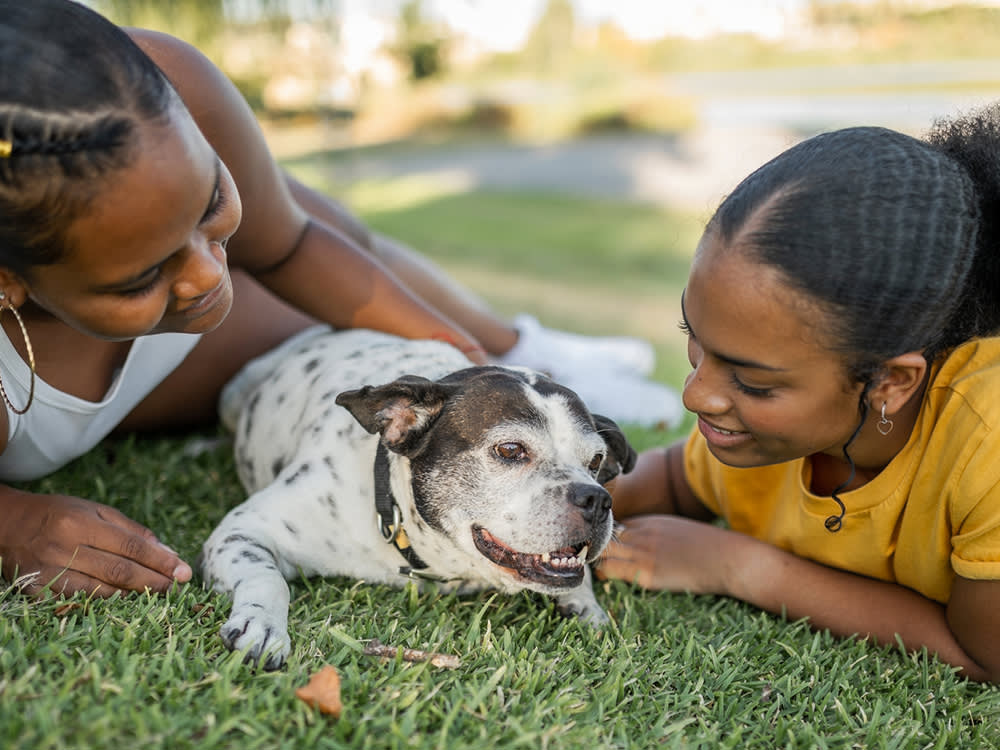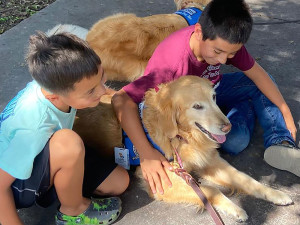Therapy Dogs Can Help You With Your ADHD
Happy news: Pups can help support your (or your kid’s) everyday needs.

Share Article
In recent years, with the help of TikTokopens in a new tab and a general ease of the stigma around mental health, we are finally talking about Attention Deficit/Hyperactivity Disorder (ADHD). The days of feeling like the odd one out in the classroom or being called hurtful (and uncreative!) names like “space case” are hopefully behind us as disability advocates continue to educate schools and workplaces on accommodating their neurodiverse students and colleagues. Plus — bonus: It turns out dogs can support the needs of folks with ADHD.
Concerned about the lack of treatment for those living with ADHD, researchers studied the positive effects of therapy dogsopens in a new tab on children with the disorder. Although therapy dogs have been used to help kids with ADHD for a long time, this study is the first randomized experiment to document the effects people have been anecdotally reporting for years. Here’s what researchers learned about how therapy dogs effectively reduce symptoms of this disorder in children.

Get (totally free) deals for food, treats, accessories, tech, and way more pet parenting must-haves.
opens in a new tabHow do therapy dogs help children with ADHD?
Catecholamines are important in stress responses. Children with ADHD may suffer from abnormal physiological factors in the catecholamine system, especially dopamine receptors and transporters, and the genes that are necessary to convert it to norepinephrine. The result of these abnormalities is decreased motivation and reduced emotions, which can lead to inattention and disinterest in social interactions as well as in the learning process.
If this “Motivational Hypothesis” is true, then interacting with dogsopens in a new tab may help these kids by heightening their arousal and emotional states and leading to increased attention and interest in the environment in which therapy takes place. It’s also possible that the opportunity to interact with a therapy dog motivates children to comply with the requirements of therapy and to engage with the therapist.
Dogs increase the odds of improvement.
The kids in the study were all seven to nine years old and none of them had ever taken medication for ADHD. All of the kids were treated according to long-established best practices in the field of psychosocial intervention. Half the kids were randomly assigned to a group that also received Canine Assisted Intervention (CAI) — treated with a therapy dog. They were able to interact twice weekly with therapy dogs, reading to themopens in a new tab and teaching them new behaviors. The kids who did not work with a therapy dog read to realistic dog puppets and taught other children specific skills.
Children in both groups showed improvement in their ADHD symptoms, but standard psychosocial intervention combined with therapy-dog work was more effective than psychosocial intervention alone. Specifically, the kids who interacted with therapy dogs had greater improvement in social skills and attention than kids whose treatment did not include dogs. They also had fewer behavior problems than the kids receiving standard treatment without dogs, and they showed positive improvements earlier in the study than the group of kids who did not interact with dogs. There were no differences found between the groups in terms of their hyperactivity and impulsivity.
The future of ADHD treatment options.
There is a big push to develop and study new therapies to treat ADHD that do not involve medication. Many parents are hesitant to use medication with their children and typically only use it for one to three years. There is a strong possibility that many parents will be more open to therapy dog work than to using a medication, so treatments with dogs could result in higher long-term compliance.
This study showed that therapy with dogs improved some symptoms of ADHD but not others, so it is likely that multiple treatment types are needed to target the full range of symptoms. There is still much to learn about the best way to incorporate therapy dogs into the treatment of kids with ADHD, but — thankfully — the future of neurodiversity looks a lot brighter (and cuter) with these furry pals in the mix.

Karen B. London, PhD, CAAB, CPDT-KA
Karen B. London, Ph.D., is a Certified Applied Animal Behaviorist and Certified Professional Dog Trainer who specializes in working with dogs with serious behavioral issues, including aggression, and has also trained other animals including cats, birds, snakes, and insects. She writes the animal column for the Arizona Daily Sun and is an Adjunct Professor in the Department of Biological Sciences at Northern Arizona University. She is the author of six books about training and behavior, including her most recent, Treat Everyone Like a Dog: How a Dog Trainer’s World View Can Improve Your Lifeopens in a new tab.

Hilary Weaver
Hilary Weaver is the senior editor at Kinship. She has previously been an editor at The Spruce Pets, ELLE, and The Cut. She was a staff writer at Vanity Fair from 2016 to 2019, and her work has been featured in Esquire, Refinery 29, BuzzFeed, Parade, and more. She lives with her herding pups, Georgie and Charlie.
Related articles
![Dog sitting in a tent surrounded by candles and crystals]() opens in a new tab
opens in a new tabAlternative Therapies Can Zen Out Your Pet, Too
Wellness treatments like acupuncture, Reiki, and sound baths are helping pets heal and bond with their parents.
![Unrecognizable man sitting at desk petting his dog]() opens in a new tab
opens in a new tabHow to Pet a Dog — Yes, You Do Need Lessons
There’s a difference between being affectionate and being annoying.
![A woman holding a cat close to her while sitting on a yoga mat.]() opens in a new tab
opens in a new tabShockingly, Your Pet Will Enhance Your Mindfulness Practice
The next time they try to kiss your face while you’re in corpse pose, let them.
![Backlit photo of a woman seated on an airplane holding her dog in her lap while they both look out of the open window.]() opens in a new tab
opens in a new tabYou Can’t Fly With Your Your ESA, But Your PSD Is Welcome on a Plane
Find out how here, including what the heck those acronyms mean.
![A woman laying on a zig zag patterned blanket while curling around her brown and white dog]() opens in a new tab
opens in a new tabHow Do I Register an Emotional Support Animal?
Confused about ESA rules? Here’s a comprehensive guide that explains everything.
- opens in a new tab
Does Your Dog Have Therapy Dog Potential?
Renowned animal behaviorist Patricia McConnell, PhD, on what it takes to be a great therapy dog.








